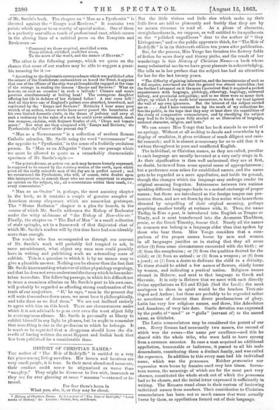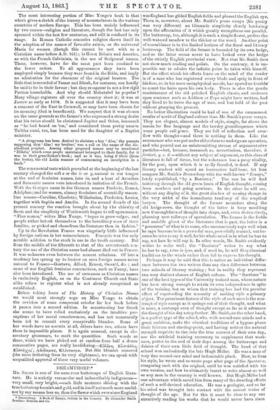HISTORY OF CHRISTIAN NAMES.* Tux author of "The Heir of
Redclyffe " is entitled to a very fair place among living novelists. Her heroes and heroines are very small people, it is true. In their most abandoned monients, their conduct could never be stigmatized as worse than " naughty." They might be tiresome to live with, inasmuch as they are for ever glancing at some " mamma "—external or in- ternal, For fear there's berm in What you, she, it, or they may be about.
* Eistory of Christian Names. 13y the author of "The Heir of Redelyffe," " Laud- marks of History," &e. Loudon : Parker, Son, and Bourn.
But the little virtues and little sins which make up their little lives are told so pleasantly and freshly that they are by no means tiresome to read of. As a phase of character, straightlacedness is, we suppose, as well entitled to its apotheosis as the "polished ungodliness" dear to the author of " Guy Livingstone," and so the public appears to think, for "The Heir of Redclyffe " is in its thirteenth ed;tion ten years after publication.
But, for the present, Miss Yonge has forsaken the flowery fields of fiction for more dusty and thorny paths, and the result of her wanderings is this History of Christian Names—a book whose many substantial merits we have great pleasure in acknowledging. She tells us in her preface that the subject has had an attractiom for her for the last twenty years.
"The difficulty of gaining information, and the inconsistencies of such as- I did acquire, convinced me that the ground was almost untrodden ; but the further I advanced on it the more I perceived that it required a perfect acquaintance with language, philology, ethnology, hagiology, universal history, and provincial antiquities ; and to me these were so many dark alleys, up which I only made brief.excursions, to knock my head against the wall of my own ignorance. But the interest of the subject carried me on . . . And I have ventured to lay the result of my collections be- fore the public, in the hope that they may at least show the capabilities of the study of comparative nomenclature, and by classifying the subject. may lead to its being more fully studied as an illustration of language, national character, religion, and taste."
We can assure Miss Yonge that her book stands in no need of an apology. Without at all seeking to dazzle and overwhelm by a display of erudition, it gives evidence of much diligent and care- ful research; and it is almost unnecessary for us to add that it is written throughout in pure and unaffected English.
The Latin nomenclature may be considered the parent of our own. Every Roman had necessarily two names, the second of which was the n omen—the name par excellence—and this he shared with the whole tribe, who were held to have sprung from a common ancestor. In case a man acquired an additional appellation, honourable or ludicrous, it passed to all his male descendants, constituting them a distinct family, and was called the cognomen. In addition to this every man had his individual name, which was the prienomen. Neither przenomina nor cognomina were borne by females until very late times. Seven- teen names, the meanings of which are for the most part very obscure, constituted the whole stock out of which the prienomen had to be chosen, and the initial letter expressed it sufficiently ire writing. The Romans stand alone in their custom of bestowing individual names from numbers. Their contribution to Christian nomenclature has been not so much names that were actually borne by them, as appellations formed out of their language. The most interesting portion of Miss Yonge's book is that which gives a sketch of the history of nomenclature in the various countries of modern Europe. This has been mainly influenced by two causes—religion and literature, though the last has only operated within the last few centuries, and still is confined in its range. In Roman Catholic countries religion shows itself in
the adoption of the names of favourite saints, as the universal Maria for women (though this cannot be met with as a Christian name before A.D. 851) ; in Great Britain and America,
as with the French Calvinists, in the use of Scriptural names. 'These, however, have for the most part been confined to the lower orders. To all appearances they have been employed simply because they were found in the Bible, and imply no admiration for the character of the original bearers. The little that is recorded of Tamar and Dinah, for instance, can hardly be said to be in their favour ; but they re-appear in not a few rigid Puritan households. And why should Mehetabel be popular ?
Many village registers all over the country show it; it was at Jarrow as early as 1578. It is suggested that it may have been a remnant of the East in Cornwall, or may have been chosen for its meaning (God is beneficent). We suspect that it was chosen on the same grounds as the farmer's who expressed a strong desire that his twins should be christened Jupiter and Orion, inasmuch as "lie had heard on 'em," and considered them pretty names.
Talitha cumi, too, has been used for the daughter of a Baptist minister.
"A clergyman has been desired to christen a boy Alas,' the parents supposing that 'Alas I my brother,' was a call on the name of the dis- obedient prophet. Among other proposed names may be mentioned *Elibris,' which some people maintained belonged to their family, for it was in their grandfather's book; and so it was, being B libris (from the hooks), the old Latin manner of commencing an inscription in a book."
The ornamental taste which prevailed at the beginning of the last century changed the soft e or the is or y, natural to our tongue at the end of feminine names, into ia, and a host of Arcadian and Romantic names were introduced in imitation of the French.
With the Georges came in the German names Frederic, Ernest, Adolphus ; and for women, clumsy feminines of essentially mascu- line names—Caroline, Charlotte, Wilheltnina, Frederica, Louisa, together with Sophia and Amelia. In the second decade of ttle present century the reaction brought about by the chivalry of Scott and the simplicity of Wordsworth began to tell upon names. "Fine names," writes Miss Yonge, "began to grow vulgar, and people either betook themselves to the hereditary ones of their families, or picked and chosefrom the literature then in fashion.'' Up to the Revolution France was singularly little influenced by foreign nations in her nomenclature. Francois was the only notable addition to the stock in use in the tenth century. But from the middle of the fifteenth to that of the seventeenth cen- tury the use of the Christian name had almost died out in France.
It was unknown even between the nearest relations. Of late a tendency has sprung up to bestow on men foreign names never natural to France—Gustave, Alfred, Ernest, Oswald, &c. ; and some of our English feminine contractions, such as Fanny, have also been introduced. The use of surnames as Christian names is exclusively English, as on the Continent Church and State alike refuse to register what is not already recognized as established.
Before taking leave of The History of Christian Names we would most strongly urge on Miss Yonge to obtain the revision of some competent scholar for her book before it passes into a second edition. In accentuating her Greek she seems to have relied exclusively on the intuitive per- ceptions of her moral consciousness, and has not unnaturally been led to commit every conceivable blunder. Some of her words have no accents at all, others have two, others have them in impossible places. It is again unusual, except in ele- mentary grammars, to mark the quantities. Such words as these, which we have picked out at random from half a dozen consecutive pages, are really bewildering—Eiinps, EZ; orialog, IdePraXog-, Arzaapag, KXiorairpcc. But this blemish removed the more irritating from its very slightness), we can speak with unqualified approval of these very useful volumes.































 Previous page
Previous page